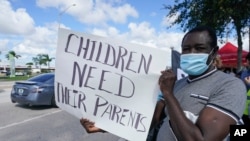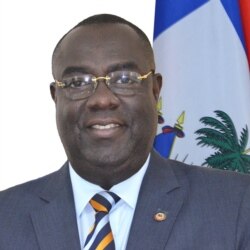The Biden administration has declined to comment on whether Temporary Protected Status (TPS) will be extended for Haitians.
“By law, TPS designations are made by the Department of Homeland Security after consultation with the appropriate agencies,” State Department spokesperson Ned Price told VOA. “So, we wouldn’t want to comment on any sort of internal deliberations when it comes to TPS.”
TPS is a designation made by the secretary of homeland security to individuals from countries severely impacted by natural disasters or armed conflicts. It allows beneficiaries to live and work in the United States for a period of time.
The TPS status Haitians currently hold was enacted by the Obama administration on January 21, 2010, nine days after a massive 7.0-magnitude earthquake hit the island nation, killing at least 250,000 people and displacing 5 million others.
In October 2020, then-candidate Joe Biden made a campaign stop in the Little Haiti neighborhood of Miami, Florida, where he courted the Haitian-American vote and promised to act on an immigration issue high on their list of priorities, the TPS program.
More than 55,000 Haitians are enrolled in the program, according to the National Immigration Forum.
The Trump administration had planned to end TPS in September 2021. But the Department of Homeland Security issued a Federal Register notice on December 9, 2020, announcing that TPS beneficiaries from Haiti would retain their status through October 4, 2021.
Biden’s Department of Homeland Security secretary, Alejandro Mayorkas, who is Cuban-American, was confirmed by the Senate on Feb. 2. He made history as the first Latino and first immigrant to hold that position.
Haiti’s position
Haiti’s ambassador to the U.S., Bocchit Edmond, has called on the Biden administration to work with Congress to find a solution.
“We do hope that the Biden administration, with the help of the U.S. Congress, will find a final resolution to this very sensitive issue impacting a number of Haitians. The human impact should be considered,” Edmond told VOA. “The Embassy of Haiti will continue to work with U.S. officials as we advocate for Haitians in the United States.”
Prominent Haitian immigration advocate reaction
Reacting to the State Department’s stance on TPS, the Miami-based Family Action Network Movement (FANM), a grassroots immigration advocacy group, called on the Biden administration to act quickly.
“This is something FANM has been advocating for, along with other immigrant rights organizations. The time to do this is now," Marleine Bastien, executive director of FANM, told VOA.
What’s happening in Haiti?
Haiti has battled political turmoil and a spike in violent crime over the past year. President Jovenel Moise is at odds with members of the opposition about when his term expires. He plans to step down on February 7, 2022, when a newly elected president takes power. But the opposition cites an article in the Haitian constitution that states Moise’s term should have ended on February 7, 2021.
Moise was sworn in on February 7, 2017, for a five-year term after winning a 2016 presidential election. That vote was a re-do after the 2015 election results were annulled over fraud allegations.
The U.S. and much of the international community back Moise’s claim that his term will end next year.
However, both the Trump and Biden administrations have repeatedly criticized Moise for ruling by decree since January 2020, when two-thirds of the parliament’s terms expired. They have also called on him to organize elections as soon as possible.
The United Nations, the Organization of American States and the European Union have expressed the same concerns.
Moise defended his decision not to organize elections last year, citing the pandemic, a crippling economic crisis, a spike in violent crimes and “peyi lok,” a series of massive anti-government protests that halted operations of businesses, schools and transportation.
Moise announced in February that a constitutional referendum was planned for April and legislative and presidential elections would be held in September.
New wave of asylum seekers?
Asked by VOA if the current political instability in Haiti could cause more Haitians to seek asylum in the U.S., the State Department's Price did not give a direct answer.
“What I would say is that it is the responsibility of Haiti’s government to organize elections in 2021 that are free, that are fair, that are credible,” Price told VOA. “We join the international community in calling Haitian stakeholders to come together to find a way forward. What we have said is that the Haitian people deserve the opportunity to elect their leaders and to restore Haiti’s democratic institutions.”
Nike Ching at the State Department and Elizabeth Lee in Los Angeles contributed to this report.







